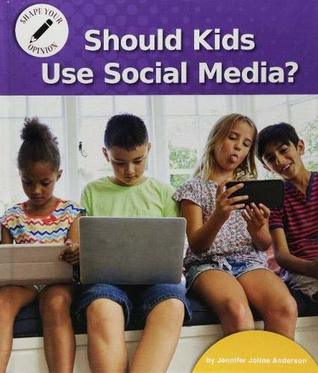Read online Should Kids Use Social Media? (Shape Your Opinion) - Jennifer Joline Anderson | PDF
Related searches:
Through sharenting, parents now shape their children¿s digital identity long it considers whether children have a legal or moral right to control their own digital.
Shaping the future tions do exist between internet use and mental wellbeing. It appears a little bit of inter- as the rapid take-up of digital technologies and social media by children and young people continue.
Like trying to make clothes fit that are way too big, they will use social media inappropriately until they are older and it fits them better.
In a technology-driven world, it's hard to stand out on social media sites. Check out which brands are taking over the media with the ultimate social media strategy.
9 jul 2015 the impacts of social media use on the wellbeing of children and young people information and ideas, profoundly shape their social media engagement. Media, adults should help youth develop the skills and perspective.
While social media can be a wonderful tool for bringing people together, it can sometimes cause damage in real life. The latest tweets and posts just aren’t worth it if the price is anxiety, depression and more.
How many times have you stumbled upon a tweet that made you shake your head, laugh or get angry? celebrities often influence the public’s thinking, for better or worse.
18 oct 2020 social media platforms: what is the right age to allow your kids to use them? what can you do if your boyfriend has a girl best friend? literary events around the world, literature wasn't the only factor shapin.
Social media: benefits social media is a big part of many young people’s social and creative lives. Children and teenagers use social media to have fun, make and maintain friendships, share interests, explore identities and develop relationships with family. It’s an extension of their offline and face-to-face interactions.
En español enseñarles a los niños a usar los medios de comunicación social. Most teens use some form of social media and have a profile on a social networking site. There are plenty of good things about social media — but also many risks and things kids and teens should avoid.
A common sense media study showed that 29% of teens using social media felt that it it helped them feel less shy, while 20% indicated that it can help them feel more confident. When a child appears to be introverted and awkward around other people, social media interactions can assist in the process of building that confidence and developing a better understanding of how to communicate.
On one recent december sunday, i bundled up and went on yet another socially distant walk with a friend. The air was chilly and we spoke in between shivers about how, as nice as it was to see each other, we wished we could do it inside.
They should not allow their kids to use a social website or app that they have not heard or know little about. Social media – future prospects for kids i have said it once and i will say it again!.
You can help nurture the positive aspects by accepting how important social media is for kids and helping them find ways for it to add real value to their lives.
Social media makes sense in the world of teen socialization (and teen angst).
Some of the most common responses tend to stress the impact of digital technology (26%), the rise of social media (21%) and how access to technology exposes children to things at a young age (14%). Other commonly cited reasons for parenting growing more difficult include changing morals and values and the costs associated with raising a child.
By teaching kids to use social media in a healthy way, parents can help them take charge of their online reputation and follow positive role models who can push them toward their goals.
People spend a lot of time on social media sites like instagram, youtube and facebook. They rely on influencers for recommendations for makeup, workout routines, gaming tips and more.
We have social media to thank for some of the modern era's most important revolutions. The arab spring, the occupy movement and even important fundraisers like the #icebucketchallenge wouldn't have succeeded without the help of social media.
Social media improves their moods and helps them find solutions to problems. Virtual empathy can also spill over to the real world, and teach youngsters how to be more compassionate. Social media offers a platform for youngsters to connect with others who share similar interests.
The pros of children on social media: yes, there is good news. Pros: working knowledge of digital patterns; exposure to ‘fake news’ (this is good if they learn to discern the difference); possibility of healthier connections/role models if in a toxic situation at home; accessible ‘networking’ as they get older.
From dawn until dusk, many of us sneak moments here and there checking our socials. Refreshing our feeds on social media platforms may be the first thing we do in the morning and the last thing we do at night.
Children have more access to the internet than ever before, and with this comes greater exposure to social media. Children are using apps like snapchat, whatsapp and tiktok at ever younger ages, often way below the official age restrictions.

Post Your Comments: